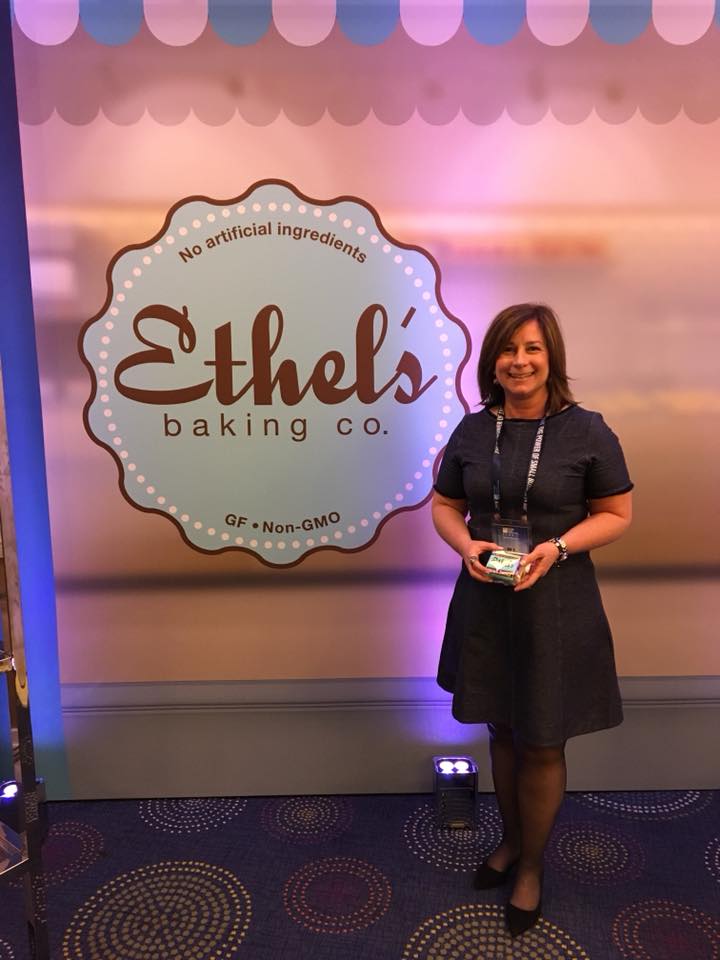By John Gallagher
Detroit Free Press
WWR Article Summary (tl;dr) Entrepreneur Jill Bommarito named her business after her grandmother, Ethel St. John. “She was an artist and baker,” she said. “She was the first person to teach me baking, sewing, painting and so much more. Mostly, that whatever I wanted to do, I could, with patience and perseverance.”
Detroit Free Press
“Who starts a business at 45?”
Jill Bommarito, founder and owner of Ethel’s Edibles, producer of gluten-free bakery snacks now found in Whole Foods, Plum Markets and many other stores in 14 states and Canada, asked that question the other day.
The answer is: Actually, quite a lot of Detroit’s midlife entrepreneurs start their first businesses in their 40s and 50s. And many do it for the same reasons Bommarito did — because her old career evaporated.
And here is why Bommarito’s story speaks so well to the thousands of other entrepreneurs trying to start businesses in Michigan. Founders of startups often show passion for their ideas, but they have next to no business savvy. They lack knowledge of budgeting, accounting, how to manage cash flow and other essential skills.
The lucky ones, or those motivated enough, learn those skills in time to survive.
Bommarito, now 51, graduated from Michigan State and worked in management at the old NBD bank for several years, then sold residential real estate for several more. But the Great Recession of 2007-09 sent her real estate career spiraling downward, and her husband, an engineer at General Motors, had barely escaped the latest round of layoffs there.
Time for something new. She and her husband decided if they were going to stay in Michigan it had to be more than for just a paycheck.
“I’ve got to do something that brings joy to people,” Bommarito said. “I decided I was just going to do it. It had a mind of its own.”
An admitted foodie who loves the social aspect of sharing meals, Bommarito started baking gluten-free dessert snacks. (Her family has suffered from celiac disease, necessitating a gluten-free diet). She started small with her trademark Pecan Dandy dessert bar, tying bows on each product and hand-delivering them herself.
And it grew from there, with long hours and some luck. Starting in 2011 at a regional food expo, she got noticed by Plum Market and other outlets.
Bommarito named her business after her grandmother, Ethel St. John. “She was an artist and baker,” she said. “She was the first person to teach me baking, sewing, painting and so much more. Mostly, that whatever I wanted to do, I could, with patience and perseverance.”
But Bommarito quickly learned that how ever much she loved creating delicious food, she had so much to learn about the business side. She admits to flunking accounting in college and having few financial skills.
“You can have the best product in the world,” she says, “and the best people and the best story, but if you aren’t seriously profitable and sustainable, it doesn’t matter.”
Money, of course, was a problem from day one. Banks weren’t interested in lending to her. She started her business with a $10,000 loan from her mother (since paid back) and another loan from a family friend.
Her big break came in 2014 when Bommarito was selected the first cohort of entrepreneurs for the Detroit version of the Goldman Sachs 10,000 Small Businesses program. Taught by faculty from Wayne State, Macomb Community College and other schools, the program offers intensive training in understanding a small business and growing it, with much personal attention to each entrepreneur.
“Oh, my gosh, we had to dig into our businesses,” she said. “And when we left we had a very solid growth plan, the opportunity to go from a Detroit company to a national company.”
The intensive program taught Bommarito skills she hadn’t yet mastered, skills she hardly knew existed up to that point.
“When I started, before we got in the program, we were in the bow-tying phase,” she said. “All of our packages had cute bows. So we went from being a bakery to a manufacturer. We still handcraft and hand touch, but everything has a time and a place and process.”
Once the program taught her to analyze her operation, she got out of the kitchen herself, turning over baking to her staff, which now numbers 16 and works from her bakehouse in St. Clair Shores.
She changed her packaging, storage, logistics. Instead of distributing all her products herself, she contracted with the Lipari food distribution company, which helped her expand her operation dramatically.
And she got smarter about financial choices. When she needed an automatic bar slicing machine, she hesitated due to the $40,000 purchase price. Then she learned she could lease the machine for much less upfront cost, and it immediately helped her cash flow.
That was crucial, because even now banks, as most entrepreneurs learn, dislike lending to startups. And even after several years of growth, the challenges remain.
“It’ll never go away,” Bommarito said. “I’m told no matter how big we are, the challenge will always be cash flow.”
Today her pecan and raspberry dessert bars are found in more and more locations, including Meijer stores in western Michigan and through the Amazon.com website, as well as Plum Markets, Whole Foods, Holiday and Westborn markets, and more.
Annual revenues recently topped $1 million, and the firm is profitable, she said. She believes craft baked products like hers are where craft beer was 10 years ago — on the verge of taking off into a major trend.
And if Ethel’s Edibles continues to grow, it’s because its founder learned the most valuable lesson of all.
A small business may start with love and guts. But it takes skills and know-how to survive.














































































































































































































































































































































































